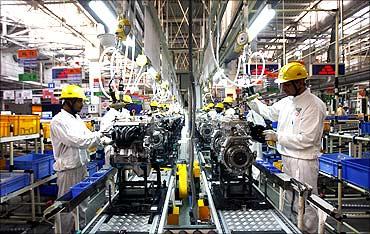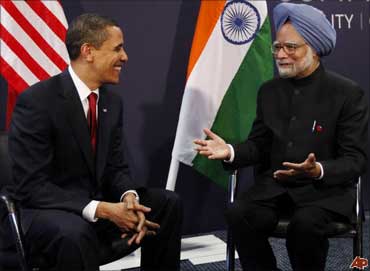Lalit K Jha in Washington
The US has expressed concern over India's lack of transparency in its trade policy, as a result of which small and medium-sized enterprises have difficulties in investing and doing business in the country.
"The US continues to be concerned about the lack of transparency in many aspects of India's trade policy," Michael Punke, US Ambassador to World Trade Organization (WTO) said at the WTO Trade Policy Review (TPR) of India in Geneva on Wednesday, according to transcripts available in Washington.
India's trade policy lacks transparency: US
Image: More proactive steps needed to enhance trade."In addition to India's failure to submit required notifications to the WTO, particularly in the areas of agriculture, subsidies, SPS and TBT, India does not regularly issue draft regulations or engage in the timely public consultations that would ensure the development of sound policies in matters affecting trade and investment," he said.
India's trade policy lacks transparency: US
Image: US President Barack Obama with PM Manmohan Singh.Noting that the lack of transparency in India's trade policy regime led the US to ask India so many written questions for this TPR, Punke said "the US became increasingly amazed at how many matters it found to be important and for which it was unable to obtain answers independently."
India's trade policy lacks transparency: US
Image: Reuters.The US joins other WTO members in supporting India's use of an open trade policy to fulfilling these broader objectives, he said. "Our support for such an approach, however, underscores our disappointment in India's reluctance to participate in meaningful market opening through the Doha Round negotiations, despite India's place as one of the world's fastest growing economies," he said.
India's trade policy lacks transparency: US
Image: Reuters."Last year's decision by the Department of Industrial Policy and Promotion to begin issuing consolidated FDI policies has helped investors avoid searching through various press notes and clarifications in order to determine the extent to which sectors were open for investment," he said.
"In addition, the continuing implementation of the Right to Information Act, begun in 2005, has been invaluable in providing affected parties with the legally enforceable right to receive information about the government's operations," Punke said.





article